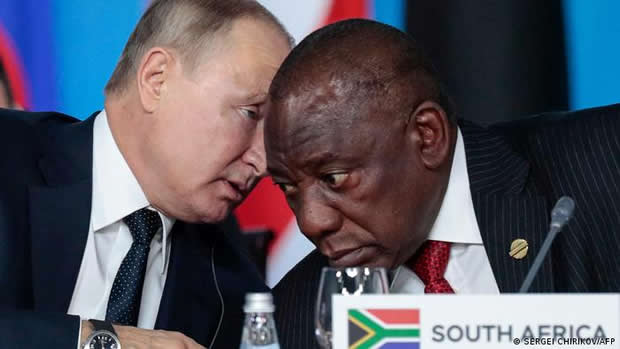
South Africa announced Wednesday that Russian President Vladimir Putin would not be attending an August summit in person, ending controversy over whether Pretoria would abide by its obligations under the International Criminal Court and arrest him.
Putin is wanted by the court for alleged war crimes during Russia’s invasion of Ukraine.
“By mutual agreement, President Putin of the Russian Federation will not attend the [meeting of the BRICS group of emerging economies],” said Vincent Magwenya, spokesman for President Cyril Ramaphosa. “However, Russia will be represented by Foreign Minister Mr. Sergey Lavrov.”
The announcement comes a day after it was revealed that Ramaphosa believed arresting Putin should he set foot in the country would amount to “a declaration of war.”
South Africa, which is a signatory to the International Criminal Court’s Rome Statute, had been looking for possible ways out of acting on the warrant despite pressure from the political opposition and rights groups to honor its commitments.
Mia Swart, a law professor at Johannesburg’s Witwatersrand University, told VOA that South Africa is now relieved of any obligation to act.
“It will not be necessary for the government to go through any of the legal maneuvers they’ve been considering over the last month, such as even withdrawing from the statute,” Swart said.
She added that the government’s announcement shows they realized there was no way of escaping their international obligations.
“In some sense this is a good thing, it means that they take the ICC seriously, and one can read into this that there is no, you know, that there is no … plan to withdraw from the ICC imminently,” she said.
Elizabeth Sidiropoulos, director of the South African Institute of International Affairs, said that Ramaphosa’s argument that arresting Putin would have been seen as a “declaration of war” by Moscow – which was rejected by South Africa’s opposition – was not necessarily incorrect.
“I think that isn’t an implausible assumption to make, not only in the case of President Putin but indeed in the case of any other head of state of any other country should … an attempt to arrest them in another country be executed,” Sidiropoulos said. “And certainly, Russia would see it that way.”
Asked if there is a possibility that Putin would ever face trial in The Hague, ICC President Piotr Jozef Hofmanski told VOA, “It is possible, but I cannot predict when it could happen. The ICC itself has no power to arrest anyone … we rely on state cooperation.
“But [past examples] show that sometimes you have to be patient,” he added. “The arrest warrants do not disappear.”
South Africa has been widely criticized by the West for what is perceived as its bias toward Moscow, though the government rejects the allegations and insists it has taken an officially neutral stance on the Ukraine war.
Last month Ramaphosa led a delegation of African leaders to both Ukraine and Russia as part of an unsuccessful peace mission.
Foreign Minister Lavrov – who will now be attending the BRICS event alongside Ramaphosa and the leaders of China, Brazil and India – was welcomed to the country on a visit earlier this year, shortly before South Africa hosted Russian warships for controversial joint exercises.
Then in May, the U.S. ambassador to the country made the startling allegation that South Africa also had provided arms to Russia – something the government has denied but says it is investigating.
Source: voanews.com























